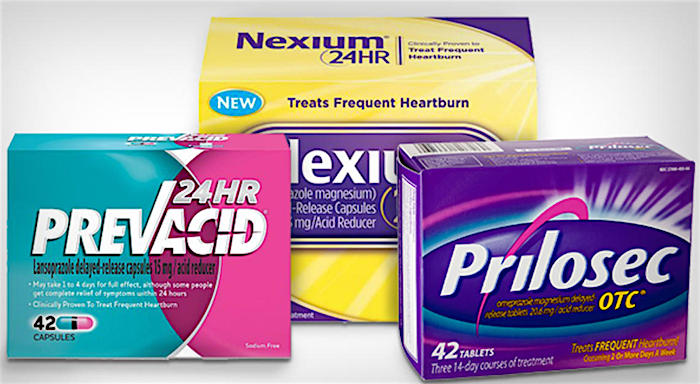 Millions of people around the world use acid suppressants called proton pump inhibitors for conditions like heartburn, gastritis and stomach ulcers. Researchers at Karolinska Institutet in Sweden now report that how the long-term use of these drugs could increase the risk of developing dementia. Their results are published in the journal Alzheimer’s & Dementia.
Millions of people around the world use acid suppressants called proton pump inhibitors for conditions like heartburn, gastritis and stomach ulcers. Researchers at Karolinska Institutet in Sweden now report that how the long-term use of these drugs could increase the risk of developing dementia. Their results are published in the journal Alzheimer’s & Dementia.
“We’ve been able to show that proton pump inhibitors affect the synthesis of the neurotransmitter acetylcholine, which plays a significant part in conditions such as Alzheimer’s disease,” says senior researcher Taher Darreh-Shori. “Since there’s no effective treatment for the disease, it’s important to avoid risk factors. We therefore want to draw attention to this so that the drugs aren’t used needlessly for a long time.”
Proton pump inhibitors (PPIs) work by blocking the pumps that transport acidic hydrogen ions from the cells that form the mucosa.
When the pumps are out of action, there is a reduction in acid and, ultimately, the corrosive damage it does to tissue. Population studies have previously shown higher rates of dementia in people using PPIs (see background material below), but what form such a connection could take has remained unknown – until now.
The researchers used 3D computer simulations to examine how six PPI variants interacted with an enzyme called choline acetyletransferase, used by the body to synthesize the neurotransmitter acetylcholine.
As a neurotransmitter, acetylcholine is needed for passing signals among nerve cells, but this only works if enough of the substance is produced. The simulations showed that all the tested drugs were able to bind with the enzyme.
The researchers discovered that all the PPI drugs inhibited the enzyme, resulting in a reduced production of acetylcholine. Drugs based on the active substances omeprazole, esomeprazole, tenatoprazole and rabeprazole had the greatest binding affinity and were therefore the strongest inhibitors of the enzyme, while the variants pantoprazole and lansoprazole were the weakest.
Additional studies are now needed to examine whether these laboratory observations represent what occurs in the body. However, Darreh-Shori is already advising against the overuse of PPIs.
“Special care should be taken with the more elderly patients and those already diagnosed with dementia,” he says. “The same also applies to patients with muscle weakness diseases such as ALS, as acetylcholine is an essential motor neurotransmitter. In such cases, doctors should use the drugs that have the weakest effect and prescribe them at lowest dose and for as short a time as possible.”
“I would, however, like to stress that the correct use of the drugs is safe also in the elderly, as long as the drugs are used for a limited time and when they’re really needed, as our nervous system is pretty flexible when it comes to tolerating short-term impact,” he adds.
The research was financed by several bodies, including the Alzheimer’s Association (USA), the Swedish Research Council, the Loo & Hans Osterman Foundation and Karolinska Institutet.
Background material:
A large population study in JAMA Neurology showed that people who use PPIs also ran a higher risk of dementia. https://www.ncbi.nlm.nih.gov/pubmed/26882076
A study in Alzheimers Research & Therapy showed that healthy young individuals who took PPIs for ten days performed worse on memory tests than previously, compared with a placebo group. https://www.ncbi.nlm.nih.gov/pubmed/26714488
According to a study published in PLOS ONE the use of PPIs in the population more than doubled from 4 to 9.2 percent between 2002 and 2009. https://www.ncbi.nlm.nih.gov/pubmed/23418510
Source: Rajnish Kumar, Amit Kumar, Agneta Nordberg, Bengt Långström and Taher Darreh-Shori. Proton pump inhibitors act with unprecedented potencies as inhibitors of the acetylcholine biosynthesizing enzyme – A plausible missing link for their association with incidence of dementia. Alzheimer’s & Dementia, May 8, 2020 DOI: 10.1002/alz.12113












The results are surprising enough that at least one leading expert on aging.